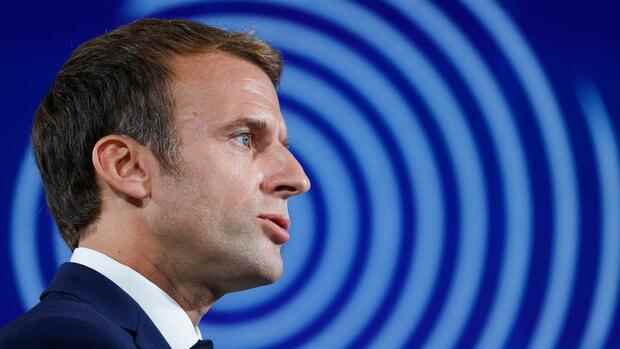Paris Emmanuel Macron has specific ideas about what the French economy should achieve at the end of this decade. The President wants France to have two million electric or hybrid cars built by 2030.
At least two “gigafactory” for green hydrogen are to bring the industry on the path to climate neutrality. The country’s pharmaceutical industry is expected to develop at least 20 biotech drugs for cancer and other diseases. The aviation industry must deliver a passenger aircraft with extremely low emissions.
The wish list that Macron presented to entrepreneurs and students in the Élysée Palace on Tuesday could be continued. In his belief in the state as the driver of industrial policy, the incumbent, who is considered liberal, hardly differs from previous French presidents.
Macron promises “massive investments in our innovation and industrial strategy”, a total of 30 billion euros over the next five years.
Six months before the French presidential election, Macron is focusing on the country’s economic future, which he wants to make more digital and greener. He speaks of a “re-industrialization” of France and of new “champions” who could take on the competition from China and the USA.
His announcements read like a program for a second term – even if Macron has not yet officially declared that he is seeking re-election.
The “France 2030” agenda follows the € 100 billion economic stimulus package that Macron’s government launched during the corona crisis. The French national debt rose to around 115 percent of gross domestic product during the pandemic, and Paris expects a budget deficit of more than eight percent this year.
From Macron’s point of view, the return to greater budget discipline will have to wait: “If we do not take this curve, we will increase our foreign trade deficit and create too few jobs and opportunities for our young population,” said the President of the investment package.
The European aircraft manufacturer Airbus wants to build a climate-neutral passenger aircraft by 2035. In France, the project is being pushed ahead with force.
(Photo: dpa)
Both start-ups and large corporations should benefit from public funding. Eight billion euros are earmarked for the decarbonization of industry and energy supply. Macron demanded that France should become the world leader in the production of climate-friendly hydrogen by 2030.
The President is not only relying on electricity from wind power and solar systems, but above all on nuclear energy. One billion euros alone is to flow into the expansion of nuclear power. Macron put investments in research and development in the health sector at seven billion euros.
Four billion euros are to go into the transport sector in order to reduce CO2 emissions from cars and aviation. The president is planning a further two billion for sustainable agricultural restructuring.
With the investment package, Macron also wants to strengthen domestic production capacities, for example for semiconductors for the automotive industry. “We have to create the framework for independent production in France and Europe,” he said.
France is currently recovering strongly from the slump in the pandemic. Paris expects growth of more than six percent this year and still four percent in 2022. Domestic demand is an important driver.
According to the Banque de France, households saved almost 160 billion euros during the pandemic – which they are now increasingly spending. Companies are also investing more and hiring again. Employment returned to the level of 2019 in the summer, and the unemployment rate is eight percent.
Fight against chronic stunted growth
With its investment program, Macron primarily wants to avert the risk of a “long-term deficit” in economic growth. French economists, however, see risks in the president’s strategy.
The growing national debt is less of a problem, says Eric Mengus, economics professor at the HEC University in Paris. “If the plan succeeds in stimulating growth, the overall debt will be more sustainable.”
Mengus fears the “watering can effect” of the investment package. “We have to avoid wanting to invest in too many areas at the same time,” he warns. The economist also points out that long-term growth can not only be achieved with funding for innovation: France urgently needs to increase spending on education and training in order to have the right qualifications on the labor market for future demands in the economy.
This point is also found in Macron’s investment plan. The president announced that he would put 2.5 billion euros in schools, universities and research centers.
With the focus on the economic future of the country, Macron is setting a counterpoint to the irritating topics of immigration and security, which dominate the political debate in France six months before the elections. In the polls, Macron is persistently at the top with values of around 25 percent and thus has a good chance of making it into the runoff election in April 2022.
However, the field of possible challengers is still incomplete. For example, the right-wing party of the former presidents Nicolas Sarkozy and Jacques Chirac does not want to clarify its candidate question until December.
It is unclear whether right-wing populist Marine Le Pen will make it into the second round like 2017. The controversial journalist Éric Zemmour, who is forging a presidential campaign from his television presence, is currently receiving a lot of support from the far-right camp. In recent polls, he was even ahead of Le Pen.
More: Ex-Prime Minister Philippe wants to attract conservative voters for the re-election of the president
